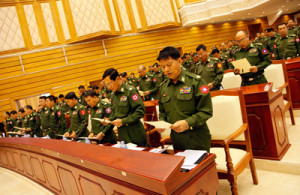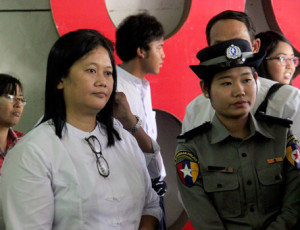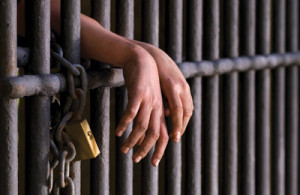At the NASUWT conference in Birmingham
We are at the NASUWT’s conference in Birmingham to ask delegates and supporters to stand with the women of Burma to end rape and sexual violence.
NASUWT is one of the biggest teachers unions in the UK and a great supporter of freedom and democracy in Burma.
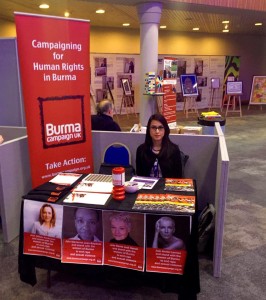
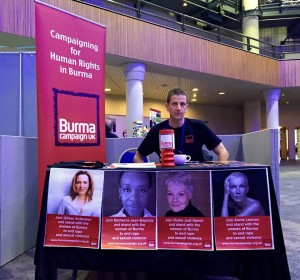
The clever and contrary Burmese military
Opinion piece in Democratic Voice of Burma by Mark Farmaner, Director of Burma Campaign UK
Love them or hate them, you have to hand it to Burma’s military, they are very smart. Characterisations of them being crazy and superstitious are simply wrong. In various forms, the military has run Burma for more than 50 years, far longer than most regimes last. There have been some bumpy transitions of leadership during this time, and the odd purge, but overall, despite personal rivalries, they have stayed disciplined and united. Hopes and predictions of splits and collapse were proved wrong. Their effectiveness and ruthlessness in dealing with opponents in Burma as well as within their own ranks helped ensure their longevity in power.
On the international stage, the Generals ran rings around the United Nations and governments, avoiding the imposition of the strongest sanctions called for by democracy and human rights activists. UN envoy after UN envoy were duped by the tactic of promises of future reform and manufactured soft-liner hard-liner divisions within the regime. Reclusiveness and games played with the granting of visas helped mute criticism, and the bar on improvements set so low that just getting into the country was considered a diplomatic success.
A skillful game of divide and rule was played with powerful neighbours India and China. Cheap deals over natural resources were used to buy political protection from neighbours on the international stage. Restrictions on access for international humanitarian agencies left them so fearful that almost uniquely around the world, they stayed almost completely silent on human rights violations and the root causes of poverty in the country.
Then, when a combination of domestic and international pressure finally did force the military to accept reforms would need to happen, they did so slowly, at their own pace, and on their own terms. They brought in a new constitution which would guarantee that they still controlled the key levers of power in the country, would have the legal power to retake control, and could veto any attempts at further reform which might threaten their power and interests.
It isn’t full democracy, but it looks a lot like it, and they calculated correctly that western countries, which would reject any such system in their own countries, would agree that it was good enough for Burma. They also persuaded their main opponents in the country to agree to work within their constitution.
And their plan has worked, almost all sanctions have been lifted, there has been a massive increase in aid and trade, they have been embraced diplomatically, and praised for their reforms. Military to military contacts have been established by the USA and others, and the British government even provides them with free training.
They get first claim on the government budget, they have billions of dollars-worth of military owned companies, and have sold off companies, natural resources and government contracts worth billions more to themselves, their relatives, friends and cronies.
The November 2015 election was the culmination of their careful transition plan to a new political system in Burma, which they see as essential to their survival. The constitution was designed knowing an NLD election landslide was likely. Hence the guaranteed seats in parliament, the high bar for changing the 2008 Constitution, and military appointed ministers. They needed the election to go smoothly, and they need a smooth handover of power. They have been applauded domestically and internationally for following their own plan.
They have power and money, and have gone from pariah to praise. So with everything going so well for them, having been so smart in developing and implementing this transition plan, why are they going after people like U Gambira, recently arrested on ridiculous immigration charges? Why are they throwing people like Patrick Kum Jaa Lee and Chaw Sandi Htun in jail for a Facebook post? Why are the students who protested last year facing such serious charges?
There has never been any justification for how the military arrested and jailed thousands of its critics over the past 50 years, but you could at least see how, from the military point of view, it was afraid that even the smallest criticism could grow to become an uprising that could threaten its rule. The same cannot be said now.
When soldiers join the military, they know that they might have to take a bullet, but at the moment, they are shooting themselves in the foot. With all their power and success, does a Facebook post really threaten them? Does U Gambira, who has not even been politically active recently, pose a threat to their power and wealth?
Uprisings took place roughly every ten years in the past, but an uprising is inconceivable now. One of the biggest threats the military face now is themselves. Whether it’s old habits dying hard, revenge, or Senior-General Min Aung Hlaing being a sensitive soul with a thin skin, arresting old critics, students, and people who might have said something on Facebook, is just plain dumb. It isn’t in the interests of the military.
They designed a constitution with a democratic face, where their power lies largely behind the scenes. The more they step into the forefront, arresting and jailing critics, the more they remind people of how they still control key levers of power, and the more people will demand the removal of their power.
Myanmar military “doesn’t need tricks” – it holds all the cards
Southeast Asia Globe interview with Mark Farmaner, director at Burma Campaign UK:
Myanmar’s majority National League for Democracy (NLD) party, led by the celebrated Aung Sang Suu Kyi, has put forward two preferred candidates for the presidential position: Henry Van Thio, an ethnic Chin, and Htin Kyaw, a 70-year-old NLD stalwart and trusted aide to Suu Kyi, It seems likely the latter will be the next person to lead Myanmar, at least in designation.
What’s your reaction to the NLD’s announcement?
There’s no surprise here that Aung San Suu Kyi has chosen someone who has been loyal and close to her for many years. And we were also expecting that she would select one candidate from one of the ethnic minority groups, because she said she wanted to be more inclusive.
What’s your opinion of Htin Kyaw?
He’s a good choice. People are already calling him a puppet, but he’s very smart – an educated man. He has a lot of experience running different organisations, so he is someone who comes with some experience. Obviously, at the end of the day, Suu Kyi will still be making all the key decisions in the government.
Do you think the military will have any tricks up its sleeve?
The military doesn’t need to have any tricks up its sleeve. It has had this transition plan where it knew an NLD election victory was inevitable and it has designed a constitution to ensure that it still controls key ministries. They will still have power and influence over government, regardless of the NLD victory. There’s no reason for them to make a fuss because, with the implementation of the plan, they need everything to go smoothly.
For the military, it was always unacceptable for Suu Kyi to become president. That’s a red line for them and that’s why they put the clause in the constitution to prevent her from becoming president. It will be an NLD-led government power sharing with the military. The key cabinet positions will be controlled by the military, the military get to choose the budget before the rest of the government and the most powerful institution is not the parliament, it’s the National Defence and Security Council, which has 11 members, six of which are from the military. So for the military, their interests are protected and as long as it’s not Suu Kyi, I don’t think they care who the president will be.
International Women’s Day: 110 Renowned Women call on Burma’s Government to end rape and sexual violence
Our campaign is reported in Karen News today:
High profile women, including actress Dame Judi Dench and actress Gillian Anderson, have put their names to a document calling on action to stop the sexual assault and rape of women in Burma.
Zoya Phan, a campaigner for human rights in Burma, said rape was being used as a weapon of war: “The continuing use of rape and sexual violence by the Burmese Army is a crime, and the lack of action to stop it is a scandal.”
High profile women sign pledge to end impunity for rape and sexual violence in Myanmar
Mizzima cover our campaign, supported by over 100 high-profile women, to end rape and sexual violence in Burma:
On International Women’s Day, 110 high profile women, including Dame Judi Dench, Annie Lennox, Jo Brand, Gillian Anderson, Imelda Staunton, Julie Walters and Zoë Wanamaker, are standing with the women of Myanmar to end rape and sexual violence according to a statement from the Burma Campaign UK.
According to the statement, “The Burma army has used rape and sexual violence against women for decades as part of their warfare against ethnic minority groups in the country. This has been done with impunity and denial. Cases of women and girls being raped by soldiers from the government’s forces include the rape of a 12 year old girl in front of her mother, and of a disabled woman. Many of the victims were gang-raped, and many killed afterwards. This is in breach of international law, and constitutes a war crime. Reports of rape have increased in recent years. UN reports have described rape and sexual violence as ‘widespread and systematic.’”
UK campaign group urges Minister of Home Affairs to release Nilar Thein
Our campaign to free activist Nilar Thein is reported in Mizzima today:
Burma Campaign UK has urged the Minister of Home Affairs, Lt Gen Ko Ko, to immediately release Nilar Thein and to reform the Prisoners of Conscience Affairs Committee the group said in a statement on 25 February 2015.
On 24th February 2016, Nilar Thein was arrested by police from Bayinnaung Police Station in Yangon for allegedly supporting student protests against the controversial Education Bill last year. The Education Bill limits academic freedoms and prohibits the formation of student unions.
Nilar Thein is one of the prominent leaders of the 88 Generation Peace and Open Society Group and a former political prisoner. She was previously arrested in 2008 and sentenced to 65 years in prison. She was released in 2012, and has continued her political activities, the statement said.
“Nilar Thein’s case shows how activists are continuing to get arrested under the repressive laws in Burma” said Wai Hnin, a Campaigns Officer at the group. “It is absurd that a prominent leader like Nilar Thein has been arrested for her political activities from last year. The arrest of Nilar Thein is unlawful and she should be released immediately.”
Nilar Thein was charged under Article 18 of the Peaceful Procession Law. She is currently being detained in Insein Prison while her trial continues.
Human rights groups push for extension to rapporteur role
Myanmar Times:
The special rapporteur’s post will come up for review at the end of the month when the UN Human Rights Council convenes on February 29. Special rapporteurs are independent experts appointed by the council to investigate, monitor and report back on human rights problems.
“A lot of governments, and obviously the Burmese military, favour removing or changing the mandate of the special rapporteur,” said Mark Farmaner of Burma Campaign UK. “She [Ms Lee] has consistently highlighted very serious ongoing human rights violations, in stark contrast to the more rosy picture that the United Kingdom, European Union and United States have often tried to present in order to justify dropping human rights as their priority in Burma.”
At the UNISON Women’s Conference
At the UNISON Women’s Conference in Brighton today, where hundreds of delegates are taking action to help stop rape and sexual violence being committed by the Burmese army. Take action yourself here.
‘This is hell’: British man held in Myanmar for 14 months without charge pleads for help
Article in today’s Guardian. Niranjan Rasalingam is an accountant from Croydon who has now spent more than a year in Insein jail in Burma without being formally accused of a crime.
Last year Burma Campaign UK wrote to British Foreign Minister Hugo Swire MP calling on him to act to secure the release of Narinjan, he refused.
Revolving door of political prisoners keeps spinning
Good news that around 52 political prisoners were released this week, but many more remain in prison.
Burma Campaign UK condemns the sentencing this week of Patrick Kum Jaa Lee for six months for a Facebook post he denies even making. Burma Campaign UK also condemns the arrest on immigration charges of U Gambira, one of the leaders of the pro-democracy uprising in 2007, for what are clearly political reasons.
The events of the past week highlight how there has been little fundamental change with the problem of people being jailed for their political beliefs, ethnicity or religion. It also highlights how President Thein Sein did not deliver on promises to free all political prisoners. Almost all those freed in recent releases where jailed during his Presidency.
The formation of a new NLD-led government, despite having to share power with the military, presents an opportunity to start to address the issue of political prisoners once and for all.

